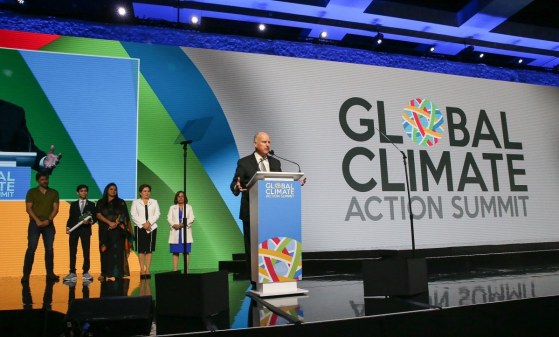Snubbing Trump’s Paris climate accord withdrawal, California proposes to price out polluters

While Trump retreats from the Paris climate accord, California legislators are pushing for a bill that could eventually price out polluters and generate hundreds of millions of dollars for clean energy research.
California’s countermeasure is found in a proposed cap-and-trade bill sponsored by state Senator Bob Wieckowski, a Democrat representing a part of the San Francisco Bay Area. The bill gradually raises the price companies, private utilities and other groups must pay to receive allowances on carbon emissions. It also furthers the state’s 2030 goal to reduce emission levels by 40 percent compared to 1990. This measure comes as the president pulls the U.S. out of an agreement joined by 195 nations in 2015 designed to mitigate the negative effects of climate change.
“I think it’s really important for everybody, wherever they are in the state of California, to know that whatever’s happening in the White House, we’re on target to make our 2030 goals and be a leader,” Wieckowski told StateScoop. “We also want other jurisdictions and other states to be looking at us and say, ‘OK, if we adopt this policy we can link onto this cap and trade program that California has.'”
Cap and trade is a tool used in California to control the amount of carbon emissions and greenhouse gasses. The regulation caps the total amount of air pollution businesses and organizations can produce, and allows those with unused emissions to trade with other organizations.
Wieckowski’s bill, introduced on May 1, raises the current rate at $13.57 per metric ton to a set price range of $20 to $30 by 2021, up to $20 to $40 by 2022, while increasing the price collar by $5 at the bottom end and $10 at the top every year after, adjusted for inflation. Wieckowski said he expects the price spike to have a profound impact on the state’s air quality, green energy infrastructure, renewable energy research, and Californian’s wallets via a climate dividend rebate handed back to residents.
Yet technologists and academia are most likely to take note of the hundreds of millions in funding that would be invested into the bill’s California Climate and Clean Energy Research Fund, a move that might establish California as the top government investor in clean energy tech, even over the federal government.
MIT Review observed that the fund would quickly surpass the Obama Administration’s most ambitious clean and renewable energy research initiative, the Advanced Research Projects Agency-Energy program (ARPA-E). Under the Department of Energy, ARPA-E was initially funded with $400 million in stimulus funding during the Great Recession in 2009, and has funded more than 400 emerging technology projects since. Trump’s proposed budget to Congress slashes funding for ARPA-E by 93 percent in the 2018 fiscal year, and dismantles it completely by 2019.
By comparison, California’s research funding would continue growing, something Wieckowski said is an imperative for renewable energy development as national labs and universities become potential benefactors.
“Our economic, energy and climate answers are going to come with California investing money into research and to have the best scientific minds advise us on how we should be planning for adaptation and how we should be planning for new energy sources,” Wieckowski said.
With the California Senate passing an aggressive clean energy bill in May that directs the state to have 100 percent renewable energy by 2045, and Gov. Jerry Brown endorsing policies that support the Paris accord, there is a strong chance the bill could pass. Wieckowski said that Brown had originally considered putting this measure into effect as part of his budget, but Wieckowski and fellow legislators said the bill required greater transparency.
“It’s a big policy discussion and we’ll do the two thirds vote, we’ll bring in all the stakeholders, and make sure that members of the legislature know about it,” Wieckowski said.
While on a political visit to China, Brown signed a new climate deal with the Asian country to collaborate on initiatives to reduce harmful greenhouse gases. Brown told the Associated Press on his visit that “nobody can stay on the sidelines.”
“We can’t afford any dropouts in the tremendous human challenge to make the transition to a sustainable future,” Brown told AP. “Disaster still looms and we’ve got to make the turn.”
In a speech at the White House Rose Garden, Trump explained his decision to have the U.S. drop out of the Paris climate accord was a result of the economic disadvantages it would place on the United States as other international competitors like China were allowed to pollute and enrich their economy. Trump said he was in favor of “clean coal” — a set of technologies that reduce but do not eliminate pollutants — and for a new agreement with more favorable terms.
“At what point does America get demeaned? At what point do they start laughing at us as a country?” Trump said. “We want fair treatment for its citizens, and we want fair treatment for our taxpayers. We don’t want other leaders and other countries laughing at us anymore.”
Where Trump has taken a step back, Wieckowski said California intends to take a step forward with the bill. His hope is to have it enacted by the end of the year. To ensure passage Wieckowski said he is meeting with Republican legislators and performing outreach with industry leadership.
“I understand that cap and trade is a complex topic, but as we explain it to more and more people, we’re getting more supporters,” Wieckowski said. “You know we’re talking to the people that are the most affected, we’re talking to the oil refineries, and the gas and the cement folks, all the people that could be affected.”






